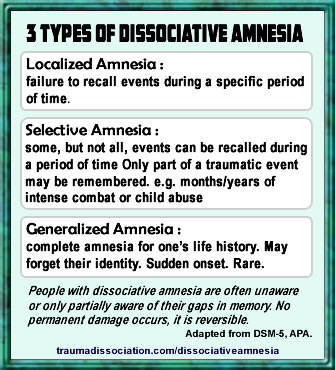Dissociative amnesia is characterized by the forgetting of an event with a high negative charge, in psychology we talk about psychogenic amnesia, dissociative amnesia or functional amnesia, this neglect is not caused by any identifiable physiological pathology and the recovery of forgotten information can be done naturally or through psychotherapy.
There are traumatic experiences that can mark us for life, can change many aspects of our lives and relationships, intense suffering has a strong impact and, to protect us, our minds retain from the traumatic event or certain characteristics associated with it. recovery process.
- Although the prevalence is not very high.
- There are specific populations or specific situations in which dissociative amnesia is common.
- For example.
- Among soldiers who witnessed war.
- People who were victims of child sexual abuse.
- Domestic violence.
- Natural disasters.
- Or terrorist acts.
It’s not just about forgetting a particular episode, it’s also about losing identity, people exposed to such an event can get lost outside the places where they live, leaving their city and their families, this can last from a few hours to an hour. few years.
In cases where the dissociative flight lasts a long time, the person can even create a new identity, with a new family and a new job.
On some occasions, this can happen as a secret desire to “escape” from an unfavorable situation, even if it is not a simulation of a disease, but the amnesia of one’s identity in response to an extremely stressful situation. In dissociative escape, the subject may exhibit normal appearance and inconspicuous behaviors.
When the episode ends, the person finds himself in an unknown place, not knowing how he got there, usually does not remember what happened during the episode, although he begins to remember everything before the episode, sometimes recovering from the previous identity. is done gradually, some details may not even recover.
Dissociative amnesia affects specific episodes that are experienced as traumatic and could have severely affected the person. Although they don’t remember the episode, it does affect their behavior. For example, a woman who was raped in an elevator doesn’t remember what happened, but avoids using the elevators and the idea of using them causes her discomfort.
It is common to retrieve memories of the event, although it is difficult to determine the amount of actual or mixed memory information with false information. Trauma-induced amnesia can occur in several ways.
Dissociative amnesia does not necessarily occur immediately after the start of the stressful event, it can occur after several hours or even days. Sometimes flashbacks of the event appear, as in post-traumatic stress disorder, but in this case, the person does not know that this content is real.
In most cases, there are behavioral problems, fatigue, sleep disorders, depression and substance abuse. When amnesia ends and the individual remembers what happened suddenly, the risk of suicide increases. Therapy can help cope with traumatic experience by supporting the family and helping to develop coping strategies.
It is common to use clinical hypnosis, relaxation and concentration techniques to achieve an altered state of consciousness that allows the person to explore their thoughts, emotions and memories that may have been blocked from their conscious mind, strategies that are not without risks, for example. such as “Recovering” false memories or remembering very traumatic experiences.

